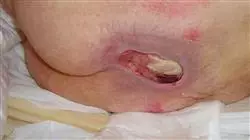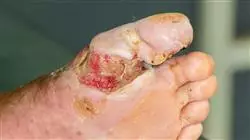University certificate
The world's largest faculty of nursing”
Introduction to the Program
The quality of urgent patient care is conditioned by professionals having updated knowledge of the care they provide. Get up to speed on nursing and urgent care procedures”

Primary care represents the gateway to the health system, sometimes receiving patients with potentially serious conditions that require immediate and complex action, generally with limited resources, which makes the role played by nursing professionals and the rest of the healthcare team in emergencies in primary care a crucial one.
The Postgraduate diploma in Nursing in Frequent Emergencies in Primary Care is a complete, up-to-date scientific program based on the latest scientific evidence and the experience of renowned professionals in primary care.
It includes comprehensive systematized action plans for the most frequent emergencies faced by nursing professionals in their daily clinical practice, helping them to make prompt and accurate decisions in these situations. It also addresses organizational aspects of pediatric emergency services and the provision of personnel and material, emphasizing their differential features.
It also addresses organizational aspects in emergency services, staffing and equipment, with emphasis on the differential characteristics of primary care versus specialized care.
Update your knowledge of urgent pathologies in primary care with this Postgraduate diploma to improve prognosis and reduce sequelae and complications”
This Postgraduate diploma in Nursing in Frequent Emergencies in Primary Care contains the most complete and up-to-date scientific program on the market. The most important features include:
- Clinical cases presented by experts on the matter The graphic, schematic, and practical contents with which they are created, provide scientific and practical information on the disciplines that are essential for professional practice
- Diagnostic and therapeutic innovations in treating patients with emergency pathologies of endocrinometabolic, cardiac, respiratory and infectious etiology in primary care settings
- Workshops on nursing techniques: interpreting electrocardiography or ultrasound in emergencies, mechanical ventilation, etc.
- Presentation of practical workshops on procedures diagnosis, and treatment techniques
- An algorithm-based interactive learning system for decision-making in the clinical situations presented throughout the course
- Includes theoretical lectures, questions to the expert, discussion forums on controversial issues and individual reflection papers
- Content that is accessible from any fixed or portable device with an Internet connection
This Postgraduate diploma is the best investment you can make when selecting an up-to-date program for two reasons: in addition to updating your knowledge of common emergencies in primary care, you will obtain a qualification from TECH Global University”
The teaching staff includes leading nursing professionals, who contribute their work experience to this refresher program, in addition to other specialist professionals in primary healthcare.
Thanks to its multimedia content developed with the latest educational technology, they will allow the professional a situated and contextual learning, that is to say, a simulated environment that will provide an immersive learning programmed to train in real situations.
The program is designed based on Problem-Based Learning, whereby students must try to solve the different professional practice situations that arise throughout the program. To that end, they will be assisted by an innovative, interactive video system created by renowned and experienced experts in primary care emergencies who have extensive teaching experience.
This Postgraduate diploma offers education in simulated environments, which provides an immersive learning experience designed to prepare for real-life situations"

It includes clinical cases to bring the program's degree as close as possible to the reality of care in nursing"
Why study at TECH?
TECH is the world’s largest online university. With an impressive catalog of more than 14,000 university programs available in 11 languages, it is positioned as a leader in employability, with a 99% job placement rate. In addition, it relies on an enormous faculty of more than 6,000 professors of the highest international renown.

Study at the world's largest online university and guarantee your professional success. The future starts at TECH”
The world’s best online university according to FORBES
The prestigious Forbes magazine, specialized in business and finance, has highlighted TECH as “the world's best online university” This is what they have recently stated in an article in their digital edition in which they echo the success story of this institution, “thanks to the academic offer it provides, the selection of its teaching staff, and an innovative learning method aimed at educating the professionals of the future”
A revolutionary study method, a cutting-edge faculty and a practical focus: the key to TECH's success.
The most complete study plans on the university scene
TECH offers the most complete study plans on the university scene, with syllabuses that cover fundamental concepts and, at the same time, the main scientific advances in their specific scientific areas. In addition, these programs are continuously being updated to guarantee students the academic vanguard and the most in-demand professional skills. In this way, the university's qualifications provide its graduates with a significant advantage to propel their careers to success.
TECH offers the most comprehensive and intensive study plans on the current university scene.
A world-class teaching staff
TECH's teaching staff is made up of more than 6,000 professors with the highest international recognition. Professors, researchers and top executives of multinational companies, including Isaiah Covington, performance coach of the Boston Celtics; Magda Romanska, principal investigator at Harvard MetaLAB; Ignacio Wistumba, chairman of the department of translational molecular pathology at MD Anderson Cancer Center; and D.W. Pine, creative director of TIME magazine, among others.
Internationally renowned experts, specialized in different branches of Health, Technology, Communication and Business, form part of the TECH faculty.
A unique learning method
TECH is the first university to use Relearning in all its programs. It is the best online learning methodology, accredited with international teaching quality certifications, provided by prestigious educational agencies. In addition, this disruptive educational model is complemented with the “Case Method”, thereby setting up a unique online teaching strategy. Innovative teaching resources are also implemented, including detailed videos, infographics and interactive summaries.
TECH combines Relearning and the Case Method in all its university programs to guarantee excellent theoretical and practical learning, studying whenever and wherever you want.
The world's largest online university
TECH is the world’s largest online university. We are the largest educational institution, with the best and widest online educational catalog, one hundred percent online and covering the vast majority of areas of knowledge. We offer a large selection of our own degrees and accredited online undergraduate and postgraduate degrees. In total, more than 14,000 university degrees, in eleven different languages, make us the largest educational largest in the world.
TECH has the world's most extensive catalog of academic and official programs, available in more than 11 languages.
Google Premier Partner
The American technology giant has awarded TECH the Google Google Premier Partner badge. This award, which is only available to 3% of the world's companies, highlights the efficient, flexible and tailored experience that this university provides to students. The recognition as a Google Premier Partner not only accredits the maximum rigor, performance and investment in TECH's digital infrastructures, but also places this university as one of the world's leading technology companies.
Google has positioned TECH in the top 3% of the world's most important technology companies by awarding it its Google Premier Partner badge.
The official online university of the NBA
TECH is the official online university of the NBA. Thanks to our agreement with the biggest league in basketball, we offer our students exclusive university programs, as well as a wide variety of educational resources focused on the business of the league and other areas of the sports industry. Each program is made up of a uniquely designed syllabus and features exceptional guest hosts: professionals with a distinguished sports background who will offer their expertise on the most relevant topics.
TECH has been selected by the NBA, the world's top basketball league, as its official online university.
The top-rated university by its students
Students have positioned TECH as the world's top-rated university on the main review websites, with a highest rating of 4.9 out of 5, obtained from more than 1,000 reviews. These results consolidate TECH as the benchmark university institution at an international level, reflecting the excellence and positive impact of its educational model.” reflecting the excellence and positive impact of its educational model.”
TECH is the world’s top-rated university by its students.
Leaders in employability
TECH has managed to become the leading university in employability. 99% of its students obtain jobs in the academic field they have studied, within one year of completing any of the university's programs. A similar number achieve immediate career enhancement. All this thanks to a study methodology that bases its effectiveness on the acquisition of practical skills, which are absolutely necessary for professional development.
99% of TECH graduates find a job within a year of completing their studies.
Postgraduate Diploma in Nursing in Frequent Emergencies in Primary Care
In the primary care setting, patients suffering from emergency situations must go to their health center for immediate medical attention. Therefore, it is essential for nursing professionals to be up-to-date in emergency care procedures in order to be able to act efficiently when faced with the urgent patient. TECH's Postgraduate Diploma in Nursing in Frequent Emergencies in Primary Care is an excellent option for acquiring the necessary knowledge and skills in this field. This academic program delves into the frequent emergencies that occur in primary care, such as asthmatic crises, hypoglycemia, hypertensive crises, among others. The course provides students with the necessary knowledge to perform a quick and accurate evaluation of the patient, identify emergency situations and apply the appropriate treatments in each case. The objective of this program is to provide nursing professionals with the necessary tools to act efficiently when faced with the urgent patient in primary care. Proper qualification is essential to provide quality health care and improve clinical outcomes.
Get trained in emergency care for nurses
TECH's Postgraduate Diploma in Nursing in Frequent Emergencies in Primary Care is an excellent option for those professionals who wish to update their knowledge in this field and acquire the necessary skills to act efficiently when faced with the urgent patient in primary care. The academic program offers a complete and detailed education, adapted to the needs and schedules of the students. In short, TECH's Postgraduate Diploma in Nursing in Frequent Emergencies in Primary Care is an excellent option for those nursing professionals who wish to specialize in urgent care in primary care. Proper qualification is essential to provide quality healthcare and improve clinical outcomes. Enroll now and prepare yourself to excel in the nursing field!







